Why Nighttime Medication Errors Happen
It’s 3 a.m. You’ve been on duty for 14 hours. Your eyes feel heavy. The IV pump beeps. You reach for the wrong vial. The patient gets the wrong dose. This isn’t a horror story-it’s a real, documented risk. When healthcare workers are tired, medication errors jump. A 2023 review of 38 studies found that fatigue played a role in 82% of medication mistakes and near-misses during night shifts. It’s not laziness. It’s biology. Your brain’s ability to focus, remember, and react drops sharply when you’re sleep-deprived. Even one night without proper sleep can make you as impaired as someone with a blood alcohol level of 0.05%.
The Real Cost of a Sleepless Night
Medication errors during night shifts aren’t just risky-they’re expensive. They cost the U.S. healthcare system an estimated $20 billion a year. But the human cost is worse. Patients suffer avoidable harm. Nurses report higher stress. Doctors make decisions they wouldn’t make when rested. Studies show that surgeons who got less than six hours of sleep had patients with 2.7 times more complications. Anesthesiologists working overnight showed a 23% drop in vigilance and an 18% drop in memory during simulated procedures. These aren’t abstract numbers. They’re real people, real outcomes.
How Fatigue Hits Your Brain
Your brain doesn’t work like a machine you can just reboot. When you’re tired, your prefrontal cortex-the part that handles decision-making, attention, and memory-slows down. Simple tasks like reading a label, double-checking a dose, or recalling a patient’s allergy become harder. A 2018 study from the American College of Obstetricians and Gynecologists found that adults who slept less than five hours saw a 25-30% drop in language skills, numeric accuracy, and short-term memory. Speed of response drops even more. You might still get the right answer, but you’ll take longer to get there-and in a fast-paced night shift, time is the one thing you can’t afford to lose.
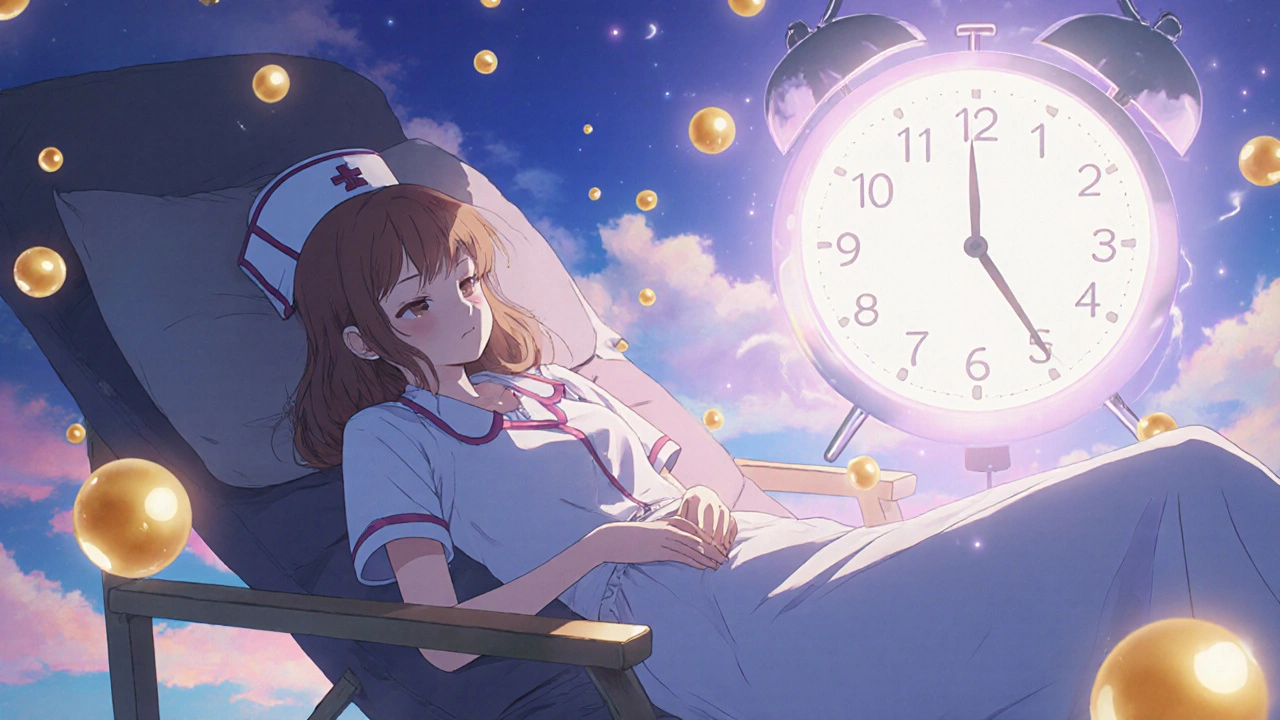
Medications That Make Fatigue Worse
Some of the drugs you or your colleagues take to cope with night shifts might be making things worse. Antihistamines like diphenhydramine (found in many OTC sleep aids) cause drowsiness in 50-60% of users. Zolpidem, a common sleep pill, leaves 15-20% of people groggy the next day. Benzodiazepines like diazepam cause lingering sedation in 30% of users. Narcotic painkillers like oxycodone and antidepressants like trazodone also cause drowsiness in 25-40% of people. If you’re already tired and you take one of these, you’re stacking risk on top of risk. The CDC’s NIOSH recommends switching to non-sedating alternatives-like loratadine instead of diphenhydramine-if you’re struggling with daytime sleepiness.
What Actually Works to Prevent Mistakes
There’s no magic fix, but some strategies have proven results. The most effective? System backups. Alarms, barcode scanning, automated dose checks, and double-check protocols reduce errors by up to 18%. A 2022 Johns Hopkins study showed that when hospitals used these tools consistently, night shift mistakes dropped noticeably. The second best? Strategic napping. A 20-40 minute nap before or during a shift can boost alertness by 12-15%. But don’t nap longer than 90 minutes-waking from deep sleep causes sleep inertia, which can leave you even more impaired for up to 30 minutes. A 22% drop in cognitive performance right after a long nap isn’t worth it.
Why Caffeine Isn’t the Answer
Coffee helps. But it’s not a cure. Caffeine can delay sleepiness for a few hours, but it doesn’t restore your brain’s ability to process information. One study found that even with caffeine, sleep-deprived nurses still made more errors than well-rested ones. And if you’re relying on caffeine to get through three straight night shifts, you’re setting yourself up for burnout, anxiety, and worse health outcomes. Studies link chronic night work to a 40% higher risk of depression, a 28% higher chance of developing diabetes, and a 22% increased risk of heart disease.
What Hospitals Should Do (And What You Can Push For)
Hospitals need to treat fatigue like a safety hazard-not a personal problem. That means enforcing reasonable shift limits, avoiding consecutive night shifts, and creating quiet, dark nap spaces. Some ICUs and ERs already do this-and see fewer errors. You can ask for: a 20-minute nap break between critical tasks, mandatory rest periods after 12-hour shifts, and access to non-sedating medications if you’re struggling with sleep. If your facility doesn’t have a fatigue management policy, push for one. It’s not about being lazy. It’s about protecting patients.
What You Can Do Tonight
- Double-check every med. Even if you’ve given it 100 times before.
- Use barcode scanning if available. Don’t skip it just because you’re tired.
- Take a 20-minute nap before your most critical tasks.
- Avoid sedating OTC meds. Switch to non-drowsy alternatives.
- Ask a colleague to verify high-risk meds-like insulin, heparin, or opioids.
- Hydrate. Dehydration makes fatigue worse.
- Get light exposure after your shift. It helps reset your internal clock.
The Bottom Line
You’re not alone in feeling exhausted. Night shifts are brutal. But your tiredness isn’t just your problem-it’s a patient safety issue. Medication errors at night aren’t inevitable. They’re preventable. The tools exist: better systems, smarter scheduling, and small, smart habits. You don’t need to be superhuman. You just need to be aware. And sometimes, that’s enough to stop a mistake before it happens.

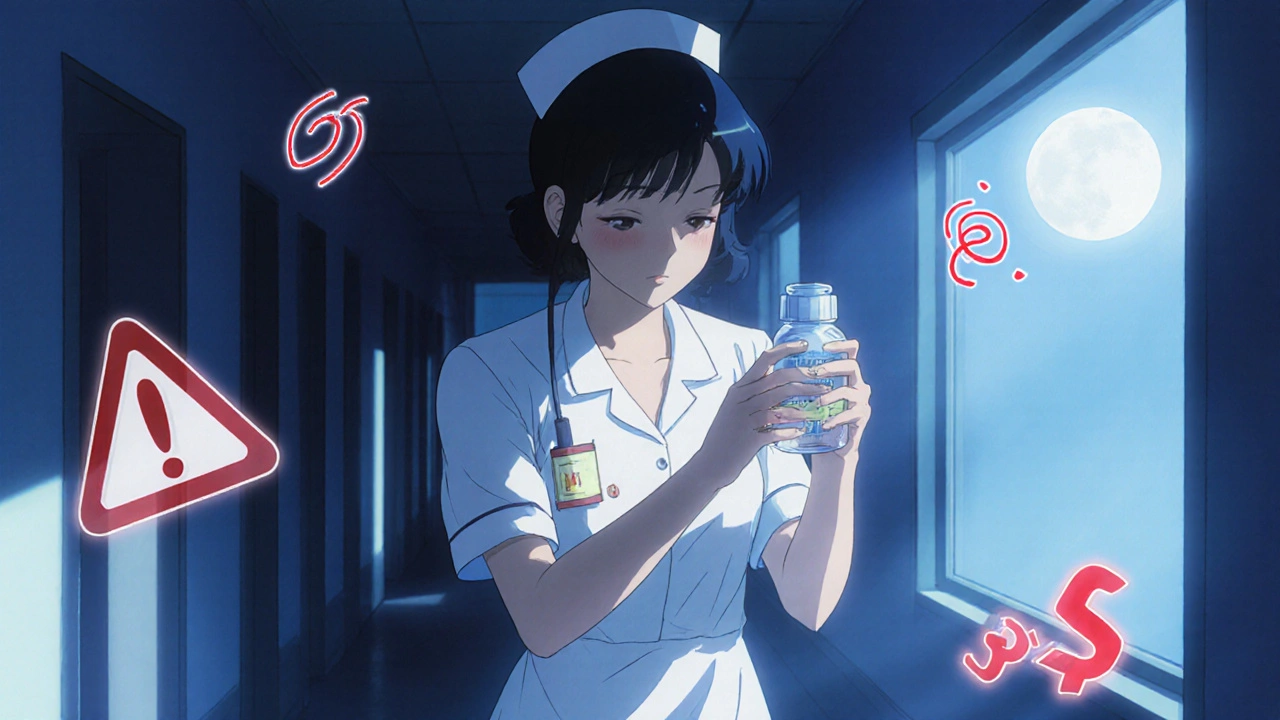

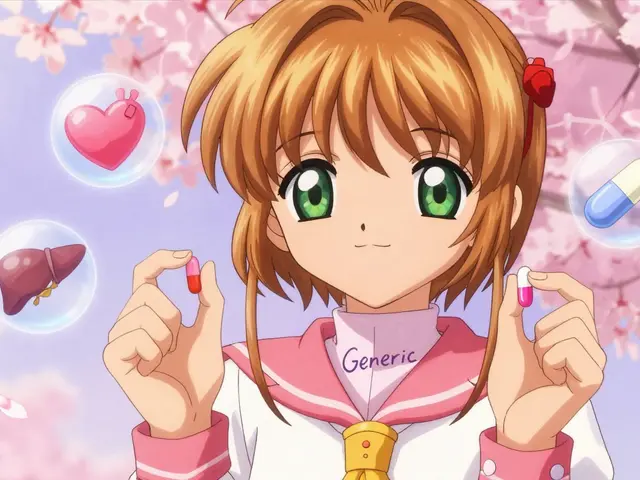

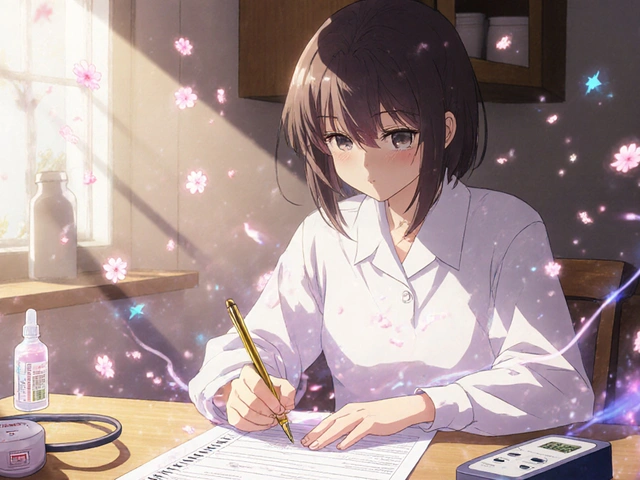

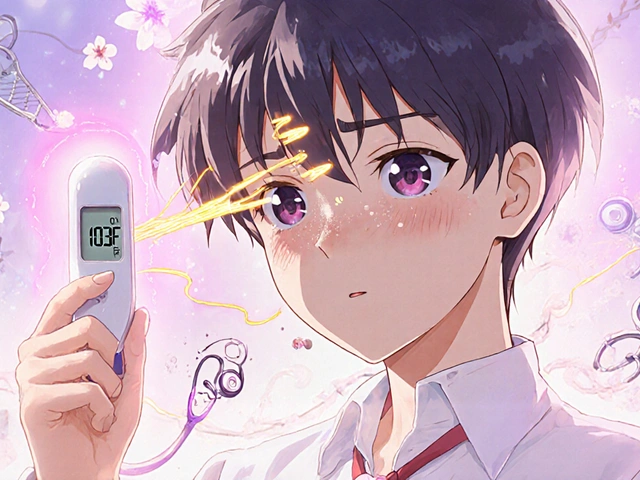
15 Comments
Sheldon Bazinga
November 22, 2025 AT 04:33lol so now we're blaming tired nurses for being human? Meanwhile the execs are sipping lattes in their 7k chairs and calling it 'systemic failure'. Wake up. The real problem is 18-hour shifts with no breaks. Not your caffeine habit.
Sandi Moon
November 23, 2025 AT 22:54This entire narrative is a distraction. Fatigue? How quaint. The true culprit is the globalist medical-industrial complex deliberately suppressing natural circadian rhythms to sell more pharmaceuticals. You think they want you alert? No. They want you dependent. On benzos. On caffeine. On compliance.
Shawn Sakura
November 25, 2025 AT 19:43hey. you're not alone. i've been there. 3am, eyes burning, hand shaking. but you know what? you kept going. and that matters. take that 20-min nap. use the barcode scanner. ask for help. you're not failing. the system is. but you? you're still showing up. that's heroism right there.
Paula Jane Butterfield
November 26, 2025 AT 23:18as a nurse who worked nights for 15 years... i used to take diphenhydramine to sleep during the day. big mistake. switched to loratadine and my brain finally stopped feeling like mush. also: hydration. no joke. i started carrying a 1L bottle. kept it full. changed everything. you're not weak for needing help. you're smart for asking.
Elaina Cronin
November 28, 2025 AT 00:24The empirical evidence presented here is irrefutable. The systemic neglect of circadian biology in healthcare scheduling constitutes a gross violation of occupational health standards. It is not merely negligent-it is ethically indefensible. The human cost is not abstract. It is measurable. It is tragic. And it is entirely preventable.
Willie Doherty
November 29, 2025 AT 19:36Interesting. But where are the data on how many of these errors occurred during mandatory overtime? Or when the pharmacy was understaffed? Or when the barcode scanner was broken for three weeks? The article implies fatigue is the root cause. It's not. It's the symptom. The root is underfunding.
Darragh McNulty
November 30, 2025 AT 04:4820-min nap = game changer 🙌 i used to think it was lazy... then i tried it after my third code blue. woke up like a new person. my team noticed. patients noticed. even the charge nurse said 'wow, you're sharp today'. just 20 minutes. no magic. just biology. try it. 🛌✨
Cooper Long
December 1, 2025 AT 05:48Fatigue is a known occupational hazard in healthcare. The solution lies not in individual behavior modification but in institutional accountability. Shift length regulation, mandatory rest protocols, and environmental controls must be codified as safety standards not suggestions. The status quo is indefensible.
Kartik Singhal
December 2, 2025 AT 09:02everyone talks about naps but nobody mentions the real elephant: the hospital admin won't hire more staff because 'budget constraints'. so we're supposed to nap our way out of a staffing crisis? genius. also why is everyone ignoring that 60% of meds are mislabeled in storage? 🤔
Logan Romine
December 2, 2025 AT 13:26so let me get this straight... we're going to nap our way out of a system designed to grind people into dust? brilliant. next they'll tell us to meditate our way out of poverty. caffeine doesn't fix broken systems. it just makes you feel like you're doing something while the machine keeps eating you alive ☕💀
Chris Vere
December 2, 2025 AT 18:11the body has rhythms. the hospital has schedules. when they dont match the body pays the price. this is not new. ancient cultures knew this. we just forgot. its not about willpower. its about alignment. maybe we need to ask why we think 3am is the right time to give insulin
Pravin Manani
December 2, 2025 AT 20:34the neurocognitive metrics are clear: prefrontal cortex hypofunction under sleep deprivation leads to executive dysfunction. this manifests as attentional lapses, impaired working memory, and reduced inhibitory control-all critical for safe pharmacological administration. the data is robust. the intervention framework is validated. the barrier is organizational inertia, not clinical ignorance.
Mark Kahn
December 4, 2025 AT 11:06you got this. i know it feels like no one sees you. but i see you. take that nap. ask for the double check. drink water. you're not a machine. you're a person doing impossible work. we're rooting for you. seriously.
Leo Tamisch
December 4, 2025 AT 15:41so we're gonna nap our way to safety while the hospital saves money by cutting nurses? genius. next they'll give us a sticker for 'good fatigue management'. 🎖️ the real fix? stop treating humans like disposable batteries. but hey. at least the coffee's free.
Daisy L
December 5, 2025 AT 16:01I'm so tired of this. I'm SO tired. I've given 100 doses of heparin. I've done it right. I've double-checked. I've triple-checked. And still, at 3 a.m., my brain just... glitches. And then someone says 'just be more careful'. CAREFUL?! I've been careful since 2018! I need a nap. I need help. I need someone to say 'this is not your fault'.